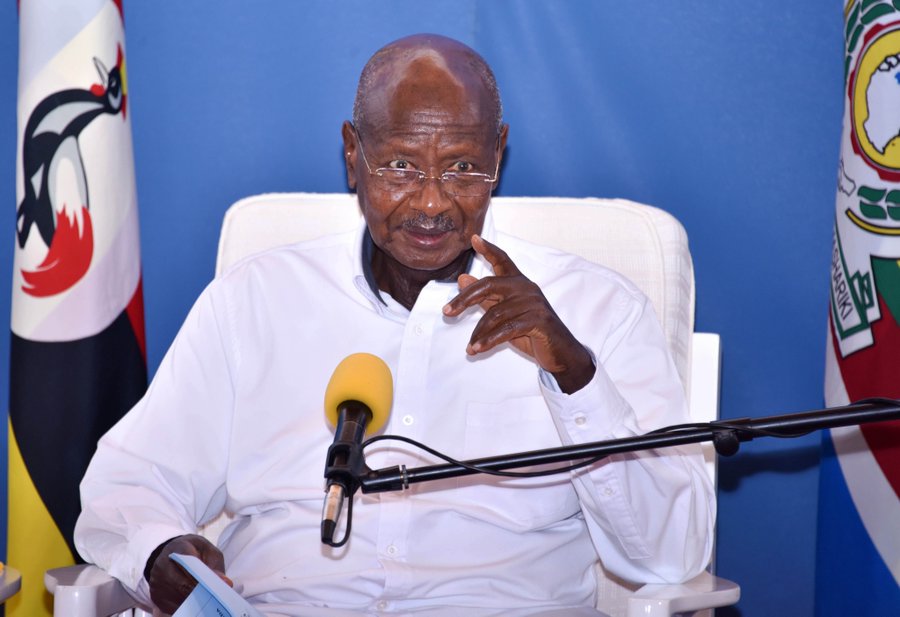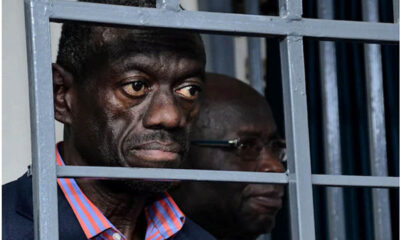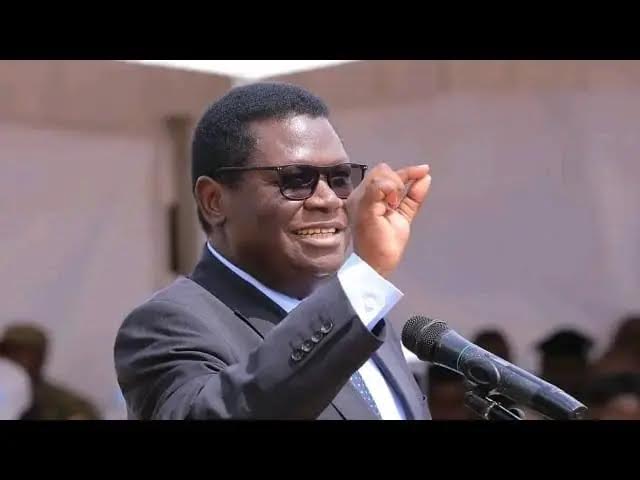Fellow Ugandans and, especially the Bazukulu, greetings.On 19th April , up to 2200hrs (10pm) in the night, I met some of the traders that are striking over Government taxes. These meetings and the ones I had with KACITA in the past, are historic. Why? It is because, they involve the debate on whether Uganda should break out of the colonial and neo-colonial slavery of “producing what we do not consume and consuming what we do not produce”, as one of the African Union documents had put it in a summarized way. This is on account of Uganda and Africa, producing raw-materials which, then, are processed into finished products abroad and brought back to us and other consumers, at much higher prices. On the social media, the other day, I briefed you about the story of tin. Finally, we are beginning to have tin refineries in Uganda. Dr. Ian Clark, in one of the papers of today, wrote about coffee, the matter we have been talking to you about. Dr. Clark pointed out, that while Uganda gets USD2.5 for a kilogram of very good screen 18 coffee, a restaurant owner in London get USD241 from the same kilogram and the consumers do not even know that the coffee is from Uganda.The following issues, are involved in the slavery of producing raw-materials for foreign industries:Getting little money while the foreign countries get much more money out of our natural resources;Losing jobs to the foreign countries, that buy our raw-materials;Losing taxes to those foreign countries which, then, give us donations with conditionalities;Inability to attract other industries that need fully processed raw-materials as inputs – e.g. copper for electrical appliances, lithium for electric car batteries, tin for the canning and computer industries, sugar and milk for baby food industries, etc.;And not using our utilities (electricity, piped water, telephones, internet, etc.,) in the production of what we consume.This is the long-held view of the NRM – right from the 10points programme: add value to all our raw-materials, if it can be done, economically, so that we get all these benefits. Tweziimbe, sikuziimba abalala (transform our country instead of building others only).We have succeeded in some sectors, such as fish processing (there are 9 factories), Maize (there are 780 factories for maize-milling), Sugar-cane (there are sixteen sugar factories), Timber (there are over 25 factories in furniture and wood products), Steel (there are sixty factories in recycled steel), Cement (there are four factories), Gold (there are seven gold refineries), Milk (there are seventeen big factories, thirty five medium, and 105 small factories, 635 Coolers), Palm oil (there are 7 big factories and 60 small ones), Soap (there are eleven factories making those products from vegetable oils), Leather (there are 3 factories), etc. Those factories, the ones mentioned above and the ones not mentioned, all together employ 720,000 Ugandans. All these are new jobs that, largely, never existed before the NRM came to power in 1986.When it comes to the arguments about taxes, Ugandans should have the following information:Is it true that all sectors are taxed? The answer is “not at all”. When you buy bananas, live cattle, milk, coffee beans, etc., from the South West of Uganda and bring them to Kampala, do you pay tax? The answer is “no”, other than the fees for the license to trade.When you buy maize from Mubende, sweet potatoes from Teso, Irish potatoes from Sebei, Sim Sim from Kitgum, Oranges from Teso, etc., do you pay tax? The answer is “no”. There are, therefore, no taxes on buying produce and selling it.Is there tax when you export something – processed or unprocessed? The answer is “no”. We long ago abolished the export tax on coffee. Therefore, there is no tax on exports of any type.When you import machinery, medicine or raw- materials, do you pay tax? The answer is “no”.Why are all these activities not taxed? It is because, we want to kweziimba (build ourselves).We encourage all that bitambuza omusayi gwaffee (blood circulation- e.g. produce buying and selling of Ugandan products or ebituzamu omusaayi (blood transfusion – machinery for production, raw materials, etc.).What, then, do we tax? We tax, mainly, ebitujjamu Omusayi (blood donation – such as imports of consumer goods such as textiles, perfumes, spirits, cars, etc.) and ebyokwejalabya (pleasure, luxury items – alcohol, cigarettes, fuel, etc.).We also tax imported essential items that we are able to produce ourselves such as textiles or even medicine and machinery such as cars when our Kiira models are fully operational.The essential items made in Uganda that have gone through factory processing may pay some taxes such as excise duty and VAT but never import tax. Then people working for the government or the private sector, pay income tax because they have regular incomes.That is the rationale behind the taxes: tweziimbe and stop the kikurukuto (Ekyejwiiso – haemorrhage) and raise Government revenue to build the infrastructure, provide security etc.When discussing with traders, some points were raised that need to be answered. They were talking of re-selling the products they get from outside to the neighbouring countries – Congo, South Sudan, Kenya etc. That is a dangerous trap – turning the whole of East and Central Africa, into a dumping ground for foreign consumers and capital goods.When will Africa develop its own capacity? How can Africa import big items such as air-crafts etc. and also the most ordinary such as clothes, food, etc.? What is, then, Africa’s share in the global trade? This stunts (okuningama, okuzingamya) Africa’s growth.The Ugandan market, the African market, are themselves a great resource. Ensawo zaffe (our pockets) are also a resource that we should use deliberately to kweziimba (build ourselves).I told our traders, how in the 1950s, I was watching the cashless people of Ntungamo, contributing to Japan’s prosperity by buying a fabric that was known as “Japanie” and also to the USA by buying another fabric known as “Marekaani”.In my social–media message the other day, I told the readers of the small tins of condensed milk from new-Zealand, Switzerland etc. It is good that after independence, UDC invested in Nytil and UGIL to produce our own textiles and garments. Idi Amin destroyed all these industries. We had to rebuild them, sometimes using the private sector.The traders, tried to respond to my remarks by saying that imported consumer items, such as second hand clothes, also create jobs. I said: “what are the jobs and other benefits?” They listed: The clearing agent, the driver of the vehicle carrying the merchandize, the off-loaders, the shop attendant, etc. The question here is: “What is the significance of these compared to the 1500 employees – mostly women, working in the integrated textile factory of Nytil – Picfare – previously Government factory? Uganda’s annual consumption of fabric per annum is 276 million meters with a per capita consumption of 5 to 6 meters per annum. Nytil is producing 25 million meters. Therefore, the internal market of Uganda, requires a total of 11 Nytil size factories, that would employ about 16,500 people, if 100 percentage value addition is undertaken to produce fabrics and garments. This is only for the internal market, without including the exports. Remember the locally made textiles do not only create jobs but makes us earn more money from our cotton ($15 per Kg of cotton instead of only USD1 per kg of unprocessed cotton), create more taxes (income tax, excise duty, VAT ) for the government, use our electricity, use our water, use our telephones, use our internet, etc. When, therefore, I am putting on a shirt of USD 5, made in Uganda, about 98% of it will remain in Uganda. It is only 2% that will go out to buy polyester, if you use it. With the imported shirt of the same value, only 15% would come to Uganda. This is kikulukuto (kyejwiisa), we cannot accept.Therefore, the products that are made by our factories using our raw-materials, give us the huge advantages mentioned above and also the small advantages our importers told me about. These were creating the jobs of the clearing and forwarding agents, the truck drivers, the loaders and off-loaders, the shop attendants etc.Load and off load locally produced products. Sell them, forward and clear them. What is the difference? Uganda spends USD 880 million per year on imported textiles!! Can you imagine!! This Kusaka (buying from others), takes back many of the dollars we earn from exporting coffee, gold, milk products, etc.Therefore, when we are talking about the tax measures, the determinant factor is how to protect our Uganda based manufacturing facilities from foreign products that are, sometimes, subsidized by the Governments of those Countries.Even if they are not subsidized, there are the disadvantages of kutandika (starting). We must help them to take off by ensuring, through taxation, that ensawo zaffee (our pockets) ziziimba ewaffe, sikuziimba Bunayira yokka (build our Country and not build foreign lands only).Remember, free slave labour, built the USA and Western Europe. Our cheap raw-materials are now continuing to build other Countries. Tulitusa ddi okuseleebwa (until when shall we tolerate being cheated)?There is the issue of also raising revenue, but it is secondary, though important also. With more factories processing our raw materials into finished products and employing all our youth, the tax base will expand and we shall get revenue from excise duty, tax on rentals, income tax, VAT or sales tax, taxes on services, etc., etc.The traders also raised issues of manufacturers going down to the retail level. When I asked some people why this was so, somebody told me that our traders did not want to sell our local products.We shall discuss all this.There was also the issue of the computer gadgets known as EFRIS. The traders pointed out that many of them are not well educated and cannot use that gadget which will necessitate them to hire people to do the work.They fear that it will overstretch their small businesses. We shall study this. If their problem does not have a serious impact in our war for emancipation from dependency on imported finished goods that suffocate our vital growth efforts, we shall see how to help them.If it does, we shall also see how to help them get alternative ways. Most importantly, our traders should be aware of the fact that it is not good for them to be agents of foreign interests at the expense of the interests of their own Country.Nobody has recently explained this to them. Many years ago, I explained it to KACITA. Some of the traders have responded to the message. There is, for instance, the young family of the fruit processors at Kakooge, Nakasongola. Our daughter Olivia Mugabe – a Luwero War young person now living in Austria, sensitized her brother, a Kikuubo trader, to shift from imports to manufacturing. We shall support them and they are doing a most commendable job.The traders had an idea they thought was a great one. That was to make Uganda a re-export hub like Dubai has been. The question is: “Whose products are you re-exporting?” The answer: “obviously, not yours. They are somebody else’s products”. We congratulate Dubai and its leaders for that innovativeness that turned a desert into a thriving hub for business by creating a tax-free zone there. By 1970, many of the imports in Uganda, were coming from UK and a bit from India. By 1979 when we got rid of Amin, that was my first time to hear of Dubai as a destination for Ugandan traders to buy cheap goods for resale in Uganda.However, Uganda is totally different. Dubai did not have the raw-materials base we have. Therefore, they did what they could – initially distribute what others have processed and, eventually, attract some of the processors to base their operations in Dubai but using imported raw-materials.Uganda is doing and can do much more than that. It is processing our raw-materials into finished products, selling them in Uganda, the region and beyond. You can see some of the initial successes like the Mukwano soaps and cooking oil using our vegetable oils (sim-sim, sunflower), the Palm oil project, the Dairy sector already talked about, the gold Refineries, the textile sector (Nytil, Fine-spinners, Mbale Industrial Park, etc.), the furniture Industry.Why should Uganda buy furniture of wood products or leather products from anywhere else? It is a betrayal. Uganda is not a Dubai, is not a South Korea, is not a Japan, is not a UK. This is because it has almost everything needed to become a global Industrial power house which was not the case with the Countries quoted above.It has a large spectrum of raw-materials (agricultural of both crops and livestock, minerals, forest products, fresh water products), it has an educated or educatable human resource that have mastered science and technology, it has got cheap renewable and clean power sources (hydro-power, solar, wind, geo-thermal, nuclear, bio-gas, etc.), it is in the Centre of the huge African continent that will have a population of 2.5 billion people by 2050 – a quarter of the human race and it is not far from North Africa, the Middle East, Europe, the Balkans and Russia and can link China with South America by planes.The only thing we do not have, is a sea port but we can solve that by having the fast Standard Gauge Railway – SGR through brother Kenya and Tanzania and, later on, DRC. Moreover, Uganda is not really land-locked. It is politics locked. Uganda has got the longest water way in the World, the Nile River that ends in Alexandria in Egypt (the Mediterranean). In the colonial times, with a few rail loops around the seven cataracts on the Nile, Uganda had a water way to the World. It is only the wars in the Sudan that closed this route. The wars will not go on forever.Therefore, Uganda is unique and nothing will stop it from being a global industrial power house with the NRM in charge. I can only call it a mini-USA, because, indeed, that Country overtook the other global powers of that time (UK, France, Germany, Holland, Portugal, Spain, etc.) because it had almost everything within its borders.The Russian Federation, definitely, has comparable or even greater capacity. A future East African Federation would have that capacity.Therefore, Ugandan traders, raise your concerns but be careful not to kwekiika mukubo rya Uganda ey’olwaleelo, n’enkya, ate Uganda eyamanyi (do not make yourselves obstacles in the path of the Uganda of today and tomorrow, which is a strong Uganda).There is something that I should not forget that may also be unique to Uganda. This is the culture of Wealth creation (okwombeka) that is indigenous to Uganda (ey’obujajja – part of our heritage).Look at the coffee, the Ankole long-horn cattle, the zebu cattle, the bananas, the millet, the sorghum, the malikwang, the lake and river fish (engege, Empuuta, Mukene), enshoonzi (mud-fish), the forests, the emyooga (black-smithing, wood work etc.), etc., that are all indigenous to Uganda and can be turned into great wealth.YOWERI K. MUSEVENI GEN (RTD)P R E S I D E N T(Ssabalwanyi) https://www.ugbulletin.co.ug/full-speech-museveni-lectures-traders-on-taxes/
News
NUP Condemns Attack on Headquarters by NRM Funded Alien Skin and Gang

The National Unity Platform (NUP) has condemned an alleged attack on its headquarters in Kavule, Makerere, reportedly orchestrated by controversial singer Alien Skin and his associates. According to a statement released by the party, the incident occurred in the early hours of the morning at approximately 3:15 a.m.
The statement alleges that Alien Skin’s group unlawfully entered the party’s premises, threatened the security guard on duty, and vandalized the walls with provocative graffiti. NUP expressed deep regret over these actions, describing them as reminiscent of tactics used by individuals deployed in the past to destabilize efforts for political reform in Uganda.
“It is regrettable that these brothers have learned nothing from those who the regime and other detractors have used against the people in the past, including Sipapa, Sobi, Zebra, Kitatta, among others,” the statement read.
The party noted that such incidents tend to spike as Uganda approaches elections, suggesting that certain groups are allegedly being used to derail the opposition’s agenda through acts of provocation and violence.
NUP urged Alien Skin and his associates to reflect on their actions, warning that history has repeatedly shown how individuals used to disrupt political struggles often face repercussions and lose public favor over time.
“The struggle for a better Uganda cannot be derailed by such antics. We call upon all Ugandans to remain vigilant and united in the face of intimidation and provocation,” the statement concluded.
This attack has sparked widespread condemnation from opposition supporters and human rights activists, who see it as part of a broader campaign to stifle dissent in the lead-up to elections. Meanwhile, calls for accountability and an impartial investigation into the incident are growing louder.
Alien Skin has yet to comment on the allegations, and efforts to reach him for a statement were unsuccessful at the time of publication.
NUP STATEMENT
This morning at 3:15am, a team led by musician Alien Skin attacked the National Unity Platform Headquarters at Kavule. They violated the premises, threatened the security guard on duty and used graffiti to draw provocative things on our walls. It is regrettable that these brothers have learnt nothing from those who the regime and other detractors have used against the people in the past, including Sipapa, Sobi, Zebra, Kitatta, among others. It is sad that each time we’re approaching elections, there is always a group willing to be used to engage in crimes against the people. We hope they will do some introspection before time catches up with them.
NUP Condemns Attack on Headquarters by NRM Funded Alien Skin and Gang
News
NUP : Museveni Apologist Alien Skin and Gang Target Uganda’s Main Opposition Party Head Officers

The National Unity Platform (NUP) has accused popular musician Alien Skin of leading an attack on its headquarters in Kavule early Saturday morning.
“This morning at 3:15 a.m., a team led by musician Alien Skin attacked the National Unity Platform Headquarters at Kavule. They violated the premises, threatened the security guard on duty, and used graffiti to draw provocative things on our walls,” read the statement issued by NUP.
NUP released a cctv video footage showing Alien Skin’s gang emerging from three cars to attack the party’s offices.
The party condemned the attack, describing it as a recurring tactic used by detractors to destabilize opposition activities, particularly during election periods.
Drawing parallels to controversial figures associated with past political violence, NUP stated:
“It is regrettable that these brothers have learnt nothing from those who the regime and other detractors have used against the people in the past, including Sipapa, Sobi, Zebra, Kitatta, among others. It is sad that each time we’re approaching elections, there is always a group willing to be used to engage in crimes against the people. We hope they will do some introspection before time catches up with them.”
Incidents
The alleged vandalism comes just weeks after Alien Skin and his entourage were accused of storming Nsambya Hospital.
In that incident, hospital operations were disrupted, and staff reportedly faced threats and intimidation, sparking widespread condemnation.
Alien Skin was jailed over the violence meted out against doctors at the hospital before being released on bail.
Alien Skin, once celebrated for his contribution to Uganda’s music industry, has increasingly been linked to politically motivated aggression.
While Alien Skin has not responded to the allegations, the incident has reignited debate about the role of artists in Uganda’s politics.
Authorities have yet to comment on the matter, but pressure is mounting for a swift and transparent investigation.
As the 2026 general elections approach, incidents like this raise concerns about the political climate and the potential for heightened tensions in the coming months.
NUP : Museveni Apologist Alien Skin and Gang Target Uganda’s Main Opposition Party Head Officers
News
Ugandan Citizen Abducted, Held in Secret Detention for Three Months, Sparks Outrage and Calls for Justice

A disturbing new case of unlawful detention has surfaced, highlighting the ongoing human rights crisis in Uganda. A Ugandan citizen was reportedly abducted and held in a secret facility, known as a “safe house,” for three months, only to be released without charge or explanation. This incident, reported by NTV Uganda, has sparked widespread condemnation and renewed calls for accountability regarding human rights abuses in the country.
While the details surrounding the abduction remain unclear, reports indicate that the individual was taken without due process and held incommunicado—an action that has long been condemned by human rights organizations. The victim’s release, with no charges filed and no clear justification, has angered activists and citizens, who view this as yet another case of egregious abuse of power by the state.
“This is a recurring pattern,” said one human rights activist. “Abductions, secret detentions, and unexplained releases have become all too common in Uganda. These acts violate fundamental human rights and erode public trust in the justice system.”
The use of “safe houses,” unregistered detention facilities reportedly operated by security forces, has been a focal point in numerous allegations of torture and illegal imprisonment. Despite repeated calls from both local and international organizations for their closure and accountability for those involved, little action has been taken to address these violations.
This case underscores the urgent need for reform within Uganda’s security apparatus and greater accountability for human rights abuses. Observers hope that drawing attention to these injustices will spur concrete action to bring those responsible to justice and ensure the protection of basic human rights.
As frustration mounts, calls for both domestic and international pressure to hold the government accountable for such crimes grow louder. “One day, there must be accountability for all these crimes against our people,” stated one social media user, reflecting the sentiments of many Ugandans.
-

 lifestyle11 hours ago
lifestyle11 hours agoChristian Combs Shows Love To His Twin Sisters On Their 18th Birthday
-

 lifestyle10 hours ago
lifestyle10 hours agoDrake Reminds Fans That PARTYNEXTDOOR Collab Album Is Still Coming Amid Petition
-

 lifestyle12 hours ago
lifestyle12 hours agoMegan Thee Stallion Supports Torrey Craig At Chicago Bulls Game Amid Rumored Relationship
-

 lifestyle11 hours ago
lifestyle11 hours agoBurna Boy Links Up With Gunna Amid Chloe Bailey Romance Rumors
-

 lifestyle10 hours ago
lifestyle10 hours agoBow Wow Sends Travis Hunter Relationship Advice After Seeing A Fake Leanna Lenee Comment Under NBA S
-

 lifestyle10 hours ago
lifestyle10 hours agoDDG Enrages Social Media After Proclaiming Himself The Best Rapper Alive
-

 lifestyle11 hours ago
lifestyle11 hours agoDaylyt Recalls Advising J Cole To Follow His Instincts Before Deleting Kendrick Lamar Diss
-

 lifestyle11 hours ago
lifestyle11 hours agoHot Boys Rock The Crowd At Houston Reunion Show








